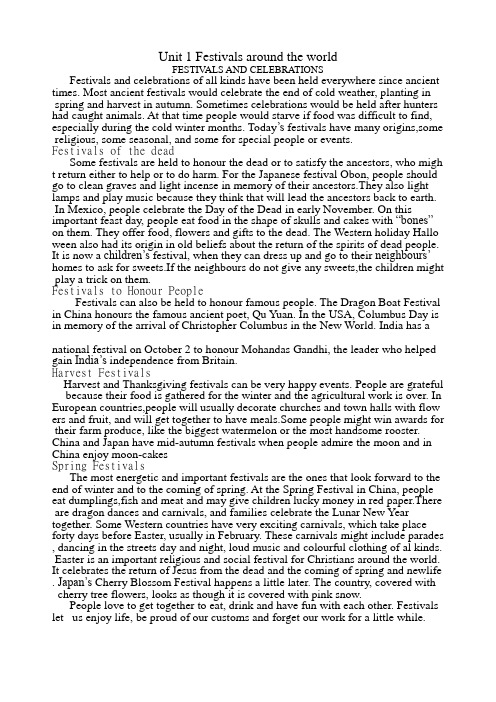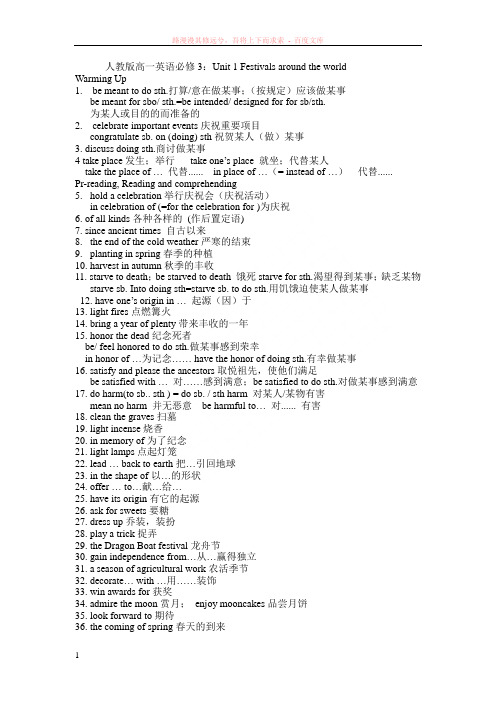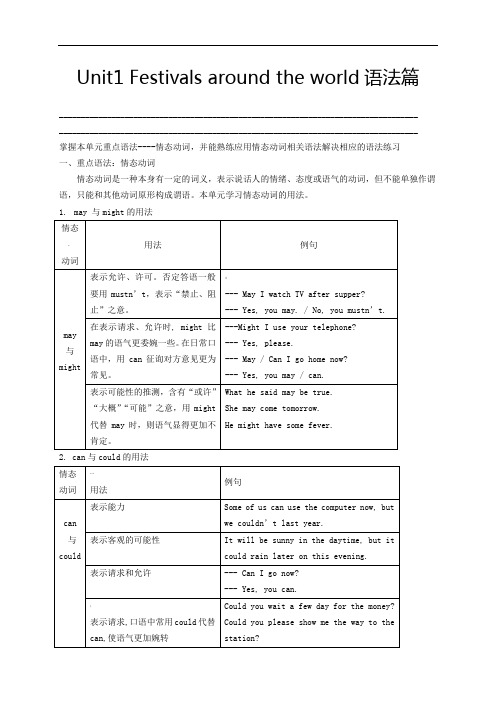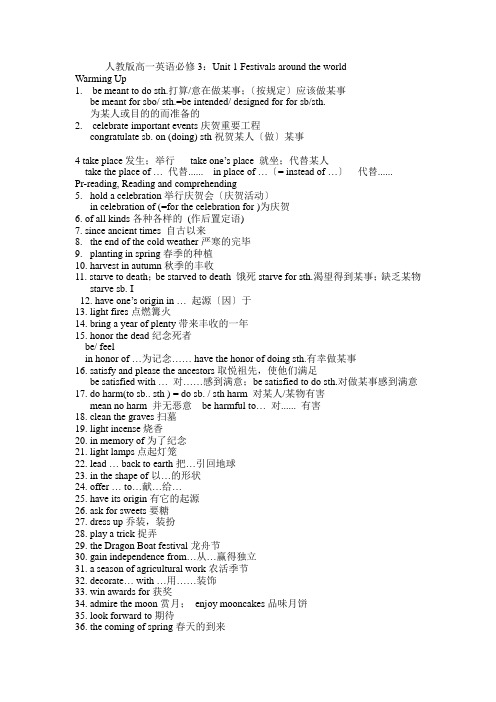必修3背景资料:Unit+1+Festivals+around+the+world+拓展阅读+Halloween
人教高中英语 必修3 unit1 Festivals around the world

各种各样的 相同种类的 不同种类的 这(那)种 某种
① 我们卖各式各样的鞋。 We sell all kinds of shoes.
= We sell shoes of all kinds. ②那类问题是很难解答的。
That kind of questions is very difficult to answer. = Questions of that kind are difficult to answer.
I mean the room for my bedroom. had meant to 本来打算做 I had meant to do English exercises first.
---You should have thanked her before you left.
---I meant __B___, but when I was leaving I couldn’t find her anywhere.
take place与happen take place:发生,举行;侧重安排或计划 而发生的事,带有“非偶然”的意思。
The Olympic Games take place every four years. happen:常指客观事物或情况偶然、不 可预料地发生。(happen to … 碰巧发生)
A. to do B. to C. doing D. doing so
想一想
2.take place发生,举行
<不及物动词,不用于被动语态> Our school sports meeting will take place next
week. Great changeds have takent. (1) 庆祝;祝贺
必修3 Unit1 Festivals around the world

必修3 Unit1 Festivals around the world第一步任务布置端午节是中国的一个传统节日,请根据下列表格用英语写一篇100字左右的短文,对此节日做一个简单的介绍。
第二步写前热身Translate the following in groups of four.1.阴历五月初五_____________________________________________2.战国时期_____________________________________________3.沦陷_____________________________________________4.在绝望中投水自杀_____________________________________________5.用竹叶和五彩绳将粽子包成金字塔形_____________________________________________第三步限时写作Ask students to finish writing the passage, they may refer to the dictated words and expressionsSuggested article: (It can be shown after the students finish their own work.)The Dragon Boat Festiv al falls on the fifth day of the fifth lunar month. It’s generally believed that the origin of the festival is to celebrate the memory of a great patriotic poet Qu Yuan, who was a native of the State of Chu during the Warring States Period and finally drowned himself in despair after the capital was lost to its enemy. People admire him so much that every year thereafter people will row dragon boats on this day in memory of Qu Yuan. And it’s also the custom now that people make Zongzi wrapped in the shape of pyramid using bamboo leaves tied with five-colored thread.People can have a lot of fun free from the boring daily life on that day so that everyone looks forward to its arrival.第四步互改互评1. Get them to exchange their work to edit and make necessary corrections in pairs.2. Ask students to give themselves assessment according to the form.A: excellent B: satisfactory C: needs improvement3. Groups of four, choose the best one of the group as an example and read to the class. 背景资料1.中西方重要节日中国节日the Spring Festival 春节Lantern Festival 元宵节Pure Brightness Festival 清明节Dragon Boat Festival 端午节Mid-Autumn Festival 中秋节Chung Yeung Festival 重阳节New Year’s Day元旦英美国家节日Christmas Day 圣诞节New Year's Day 新年Valentine's Day 情人节April Fool’s Day愚人节Easter 复活节Halloween 万圣节Thanksgiving Day 感恩节2. 感恩节的由来1620年,102位不愿忍受英国宗教迫害的清教徒乘“五月花号”(Mayflower)船历尽艰辛,来到北美大陆,在普利茅斯住了下来。
人教版高中英语必修三Unit1Festivalsaroundtheworld课文知识点解析

Unit 1 Festivals around the world 课文知识点解析Warming up1.Festivals are meant to celebrate important events.人们通过节日来庆祝重要的事情。
此句如果改成主动语态,就很容易翻译了:People mean festivals to celebrate important events.(1)mean vt. mean sb. or sth. to do sth.=intend sb. or sth. to do sth.意欲、打算让某人做某事e.g. I never mean her to read those comments.我没打算让她读那些评论。
The diagram is meant to show the different stages of the process.这个表格是准备用来展示进展的不同阶段的。
(2)event[C] n.重要的事,大事e.g. All of these are the most important events of 1994.所有这些事都是1994年最重要的事。
2.Discuss when they take place...讨论它们何时发生……take place 发生e.g. The next meeting will take place on Tuesday.下一次会议在星期二召开。
Reading:Festivals and Celebration1.Ancient festivals 古代节日ancient adj. 古代的e.g. ancient civilization of Asia亚洲的古代文明ancient Rome 古罗马to study ancient history 研究古代历史2.Festivals and celebrations of all kinds are held everywhere. 世界各地的人们举行各种各样的节日和庆祝活动。
Festivals around the world(英语必修3Unit1文章)

Unit 1 Festivals around the worldFESTIV ALS AND CELEBRATIONSFestivals and celebrations of all kinds have been held everywhere since ancient times. Most ancient festivals would celebrate the end of cold weather, planting in spring and harvest in autumn. Sometimes celebrations would be held after hunters had caught animals. At that time people would starve if food was difficult to find, especially during the cold winter months. Today’s festivals have many origins,some religious, some seasonal, and some for special people or events.Festivals of the deadSome festivals are held to honour the dead or to satisfy the ancestors, who migh t return either to help or to do harm. For the Japanese festival Obon, people should go to clean graves and light incense in memory of their ancestors.They also light lamps and play music because they think that will lead the ancestors back to earth. In Mexico, people celebrate the Day of the Dead in early November. On this important feast day, people eat food in the shape of skulls and cakes with “bones”on them. They offer food, flowers and gifts to the dead. The Western holiday Hallo ween also had its origin in old beliefs about the return of the spirits of dead people. It is now a children’s festival, when they can dress up and go to their neighbours’homes to ask for sweets.If the neighbours do not give any sweets,the children might play a trick on them.Festivals to Honour PeopleFestivals can also be held to honour famous people. The Dragon Boat Festival in China honours the famous ancient poet, Qu Yuan. In the USA, Columbus Day is in memory of the arrival of Christopher Columbus in the New World. India has a national festival on October 2 to honour Mohandas Gandhi, the leader who helped gain India’s independence from Britain.Harvest FestivalsHarvest and Thanksgiving festivals can be very happy events. People are grateful because their food is gathered for the winter and the agricultural work is over. In European countries,people will usually decorate churches and town halls with flow ers and fruit, and will get together to have meals.Some people might win awards for their farm produce, like the biggest watermelon or the most handsome rooster. China and Japan have mid-autumn festivals when people admire the moon and in China enjoy moon-cakesSpring FestivalsThe most energetic and important festivals are the ones that look forward to the end of winter and to the coming of spring. At the Spring Festival in China, people eat dumplings,fish and meat and may give children lucky money in red paper.There are dragon dances and carnivals, and families celebrate the Lunar New Year together. Some Western countries have very exciting carnivals, which take place forty days before Easter, usually in February. These carnivals might include parades , dancing in the streets day and night, loud music and colourful clothing of al kinds. Easter is an important religious and social festival for Christians around the world. It celebrates the return of Jesus from the dead and the coming of spring and newlife . Japan’s Cherry Blossom Festival happens a little later. The country, covered with cherry tree flowers, looks as though it is covered with pink snow.People love to get together to eat, drink and have fun with each other. Festivals let us enjoy life, be proud of our customs and forget our work for a little while.。
必修3 Unit 1 Festivals around the world

【本讲教育信息】一、教学内容必修3 Unit 1 Festivals around the world(一)重点单词(二)重点短语(三)重点句型二、知识精讲(一)重点单词1. belief n. 信任;信仰;信心He has great belief in his doctor. 他对他的医生无比信赖。
He came to me in the belief that I could help him.他到我这里来,相信我能帮助他。
The cruelty of the murders was beyond belief.凶手的残忍让人难以置信。
知识拓展:believe vt. & vi. believable / unbelievable adj.They need a leader they can believe in.他们需要一个可以信赖的领导。
Believe it or not, he asked me to marry him.信不信由你,他向我求婚了。
—Does he still work there? 他还在那里工作吗?—I believe so / not. 我想是/不是。
2. gain vt. 获得;得到; 赢得He has gained rich experience in these years.这些年他已获取了丰富的经验。
He has gained the respect of his friends.他赢得了朋友们的尊重。
He gained weight after recovery from his illness.康复后他的体重增加了。
I gained a lot by / from my former experience.我从以前的经验中学到很多东西。
知识拓展n. 收益;利润No pains; no gains.(谚语)不劳无获3. gather vt.采集;收集;积累;聚集The farmers are gathering (in ) crops in the field.农民们正在田野里收割庄稼。
人教版高中英语(必修3)unit1festivalsaroundtheworld

人教版高一英语必修3:Unit 1 Festivals around the worldWarming Up1.be meant to do sth.打算/意在做某事;(按规定)应该做某事be meant for sbo/ sth.=be intended/ designed for for sb/sth.为某人或目的的而准备的2.celebrate important events庆祝重要项目congratulate sb. on (doing) sth祝贺某人(做)某事3. discuss doing sth.商讨做某事4 take place发生;举行take on e’s place 就坐;代替某人take the place of …代替...... in place of …(= instead of …)代替......Pr-reading, Reading and comprehending5.hold a celebration举行庆祝会(庆祝活动)in celebration of (=for the celebration for )为庆祝6. of all kinds各种各样的(作后置定语)7. since ancient times 自古以来8.the end of the cold weather严寒的结束9.planting in spring春季的种植10.harvest in autumn秋季的丰收11. starve to death;be starved to death 饿死starve for sth.渴望得到某事;缺乏某物starve sb. Into doing sth=starve sb. to do sth.用饥饿迫使某人做某事12. have one’s origin in …起源(因)于13. light fires点燃篝火14. bring a year of plenty带来丰收的一年15. honor the dead纪念死者be/ feel honored to do sth.做某事感到荣幸in honor of …为记念…… have the honor of doing sth.有幸做某事16. satisfy and please the ancestors取悦祖先,使他们满足be satisfied with …对……感到满意;be satisfied to do sth.对做某事感到满意17. do harm(to sb.. sth ) = do sb. / sth harm 对某人/某物有害mean no harm 并无恶意be harmful to…对...... 有害18. clean the graves扫墓19. light incense烧香20. in memory of为了纪念21. light lamps点起灯笼22. lead … back to earth把…引回地球23. in the shape of以…的形状24. offer … to…献…给…25. have its origin有它的起源26. ask for sweets要糖27. dress up乔装,装扮28. play a trick捉弄29. the Dragon Boat festival龙舟节30. gain independence from…从…赢得独立31. a season of agricultural work农活季节32. decorate… with …用……装饰33. win awards for获奖34. admire the moon赏月;enjoy mooncakes品尝月饼35. look forward to期待36. the coming of spring春天的到来37.give children lucky money in red paper用红包装着压岁钱给小孩38. dragon dances舞龙灯39. the lunar New Year阴历新年40.day and night整天;日夜41.colorful clothing of all kinds各种艳丽的衣服42. Christian countries信奉基督教的国家43. be covered with被…罩着44. as though好像45.love to get together to eat, drink and have fun with each other喜欢聚在一起吃、喝、玩耍have fun with sb. =enjoy oneself / have a good time with sb.与某人一起玩得愉快46.enjoy life享受生活47. forget our daily work for a little while暂时忘记日常生活中的烦恼Learning about language and using langbuage48. have a good time with和…一起开心49. at the parking lot在停车场50. be heart-broken心都碎了51. at the coffee shop在咖啡馆里;after work下班后52. turn up出现53. right now立刻54. keep one’s word守信用55. hold one’s breath屏气56. drown one’s sadness in coffee用咖啡来解愁57. wipe the table擦好桌子58. visit the earth下凡来到人间;(be) on earth在人间59. the herd boy牛郎60. set off for home动身回家61. remind sb. of …因…想起某人62.pass the tea shop on the corner路过在转角处的茶馆63. wave at sb. 向某人招手Workbook64. wipe all one’s tears拭去泪水;hide the sadness on one’s face掩盖住脸上的悲伤65. dream about going back to one’s homeland 日夜梦想回到祖国66. win the beat actor at the Golden Rooster Award 荣获金鸡奖的最佳男演员67.be ready for a second try准备第二次尝试68.leave sb. alone让某人一个人呆会69. full-time workers全职工70.have free time有时间71 ask for permission请求许可72.have an eye examination参加一个视力检测73.sit in a café坐在咖啡厅里74.32 degrees below freezing零下32度75. pile… up along the sidewalks沿着人行道把…堆起来76. ride in horse carriage乘座马车77.admire the ice sculptures欣赏冰雕78. be dressed in heavy clothes穿了厚厚的衣服。
【教育资料】人教版高中英语必修三:Unit1-Festivals-around-the-world-

Unit1 Festivals around the world语法篇____________________________________________________________________________________________________________________________________________________________________掌握本单元重点语法----情态动词,并能熟练应用情态动词相关语法解决相应的语法练习一、重点语法:情态动词情态动词是一种本身有一定的词义,表示说话人的情绪、态度或语气的动词,但不能单独作谓语,只能和其他动词原形构成谓语。
本单元学习情态动词的用法。
1.may 与might的用法2. can与could的用法…3. will与would的用法4.shall与should的用法5. must, may (might) 和can表示“推测”的用法6.should与ought to用法;7.need与dare用法ed to与would用法例1.(2019北京卷27.)________ I have a word with you? It won’t take long.A. CanB. MustC. ShallD. Should解析:本题考察的是情态动词基本意义辨析。
can能够,可能;must必须,一定;非得;shall将要;:should应该;句意:我可以和你谈谈吗?不会花很多时间的。
根据句意可知本题使用Can I…?表示询问对方是否允许。
如:Can I use your dictionary? 我可以使用你的字典吗?答案:A。
例2.(2019大纲卷)30. Although you _____ find bargains in London, it’s not generally a cheapplace to shop.A. shouldB. needC. mustD. can解析:should应该,竟然;need需要;must必须,一定;非得,偏偏;can能够,可能,有时会…;根据句意“尽管你有时可能会在伦敦找到便宜货,但总得说来那不是一个购物的便宜的地方。
人教版高中英语(必修3)unit1festivalsaroundtheworld

人教版高一英语必修3:Unit 1 Festivals around the worldWarming Up1.be meant to do sth.打算/意在做某事;〔按规定〕应该做某事be meant for sbo/ sth.=be intended/ designed for for sb/sth.为某人或目的的而准备的2.celebrate important events庆贺重要工程congratulate sb. on (doing) sth祝贺某人〔做〕某事4 take place发生;举行take on e’s place 就坐;代替某人take the place of …代替...... in place of …〔= instead of …〕代替......Pr-reading, Reading and comprehending5.hold a celebration举行庆贺会〔庆贺活动〕in celebration of (=for the celebration for )为庆贺6. of all kinds各种各样的(作后置定语)7. since ancient times 自古以来8.the end of the cold weather严寒的完毕9.planting in spring春季的种植10.harvest in autumn秋季的丰收11. starve to death;be starved to death 饿死starve for sth.渴望得到某事;缺乏某物starve sb. I12. have one’s origin in …起源〔因〕于13. light fires点燃篝火14. bring a year of plenty带来丰收的一年15. honor the dead纪念死者be/ feelin honor of …为记念…… have the honor of doing sth.有幸做某事16. satisfy and please the ancestors取悦祖先,使他们满足be satisfied with …对……感到满意;be satisfied to do sth.对做某事感到满意17. do harm(to sb.. sth ) = do sb. / sth harm 对某人/某物有害mean no harm 并无恶意be harmful to…对...... 有害18. clean the graves扫墓19. light incense烧香20. in memory of为了纪念21. light lamps点起灯笼22. lead … back to earth把…引回地球23. in the shape of以…的形状24. offer … to…献…给…25. have its origin有它的起源26. ask for sweets要糖27. dress up乔装,装扮28. play a trick捉弄29. the Dragon Boat festival龙舟节30. gain independence from…从…赢得独立31. a season of agricultural work农活季节32. decorate… with …用……装饰33. win awards for获奖34. admire the moon赏月;enjoy mooncakes品味月饼35. look forward to期待36. the coming of spring春天的到来37.give children lucky money in red paper用红包装着压岁钱给小孩38. dragon dances舞龙灯39. the lunar New Year阴历新年40.day and night整天;日夜41.colorful clothing of all kinds各种艳丽的衣服42. Christian countries信奉基督教的国家43. be covered with被…罩着44. as though好似45.love to get together to eat, drink and have fun with each other喜欢聚在一起吃、喝、玩耍46.enjoy life享受生活47. forget our daily work for a little while暂时忘记日常生活中的烦恼Learning about language and using langbuage48. have a good time with和…一起开心49. at the parking lot在停车场50. be heart-broken心都碎了51. at the coffee shop在咖啡馆里;after work下班后52. turn up出现53. right now立即54. keep one’s word守信誉55. hold one’s breath屏气56. drown one’s sadness in coffee用咖啡来解愁57. wipe the table擦好桌子58. visit the earth下凡来到人间;(be) on earth在人间59. the herd boy牛郎60. set off for home动身回家61. remind sb. of …因…想起某人62.pass the tea shop on the corner路过在转角处的茶馆63. wave at sb. 向某人招手Workbook64. wipe all one’s tears拭去泪水;hide the sadness on one’s face掩盖住脸上的悲伤65. dream about going back to one’s homeland 日夜梦想回到祖国66. win the beat actor at the Golden Rooster Award 荣获金鸡奖的最正确男演员67.be ready for a second try准备第二次尝试68.leave sb. alone让某人一个人呆会69. full-time workers全职工70.have free time有时间71 ask for permission恳求答应72.have an eye examination参加一个视力检测73.sit in a café坐在咖啡厅里74.32 degrees below freezing零下32度75. pile… up along the sidewalks沿着人行道把…堆起来76. ride in horse carriage乘座马车77.admire the ice sculptures欣赏冰雕78. be dressed in heavy clothes穿了厚厚的衣服。
- 1、下载文档前请自行甄别文档内容的完整性,平台不提供额外的编辑、内容补充、找答案等附加服务。
- 2、"仅部分预览"的文档,不可在线预览部分如存在完整性等问题,可反馈申请退款(可完整预览的文档不适用该条件!)。
- 3、如文档侵犯您的权益,请联系客服反馈,我们会尽快为您处理(人工客服工作时间:9:00-18:30)。
HalloweenOn October 31st, dozens of children dressed in costumes(节日服装)knock on their neighbors' doors and yell "Trick or Treat" when the door opens. Pirates and princesses, ghosts and popular heroes of the day all hold bags open to catch the candy or other goodies that the neighbors drop in. As they give each child a treat the neighbors exclaim over the costumes and try to guess who is under the masks.Since the 800's November 1st is a religious holiday known as All Saints' Day(万圣节). The Mass that was said on this day was called Allhallowmas. The evening before became known as All Hakkiw e'en, or Halloween. Like some other American celebrations, its origins lie in both pre-Christian and Christian customs.October 31 st was the eve of the Celtic(凯尔特人的)new year. The Celts were the ancestors of the present-day Irish, Welsh and Scottish people. On this day ghosts walked and mingled with the living, or so the Celts thought. The townspeople baked food all that day and when night fell they dressed up and tried to resemble the souls of the dead. Hoping that the ghosts would leave peacefully before midnight of the new year.Much later, when Christianity spread throughout Ireland and October 31 was no longer the last day of the year, Halloween became a celebration mostly for children. "Ghosts" went from door to door asking for treats, or else a trick would be played on the owners of the house. When millions of Irish people immigrated to the United States in the 1840s the tradition came with them.Today' school dances and neighborhood parties called "block parties" are popular among young and old alike. More and more adults celebrate Halloween. They dress up like historical or political figures and go to masquerade parties(化妆舞会). In larger cities, costumed children and their parents gather at shopping malls early in the evening. Stores and businesses give parties with games and treats for the children. Teenagers enjoy costume dances at their schools and the more outrageous the costume the better!Certain pranks(恶作剧)such as soaping car windows and tipping over garbage cans are expected. But partying and pranks are not the only things that Halloweeners enjoy doing. Some collect money to buy food and medicine for needy children around the world.Symbols of HalloweenHalloween originated as a celebration connected with evil spirits. Witches flying on broomsticks with black cats, ghosts, goblins(小精灵)and skeletons have all evolved as symbols of Halloween. They are popular trick-or-treat costumes and decorations for greeting cards and windows. Black is one of the traditional Halloween colors, probably because Halloween festivals and traditions took place at night. In the weeks before October 31, Americans decorate windows of houses and schools with silhouettes(轮廓)of witches and black cats.Pumpkins are also a symbol of Halloween. The pumpkin is an orange-colored squash, and orange has become the other traditional Halloween color. Carving pumpkins into jack- o'lanterns is a Halloween custom also dating back to Ireland. A legend grew up about a man named Jack who was so stingy(吝啬的)that he was not allowed into heaven when he died, because he was a miser(吝啬鬼). He couldn't enter hell either because he had played jokes on the devil. As a result, Jack had to walk the earth with his lantern until Judgement Day(审判日). The Irish people carved scary faces out of turnips(芜菁根), beets(甜菜根)or potatoes representing "Jack of the Lantern," or Jack-o'lantern. When the Irish brought their customs to the United States, they carved faces on pumpkins because in the autumn they were more plentiful than turnips. Today jack-o'-lanterns in the windows of a house on Halloween night let costumed children know that there are goodies(糖果)waiting if they knock and say "Trick or Treat!"Halloween TreatsDried Pumpkin SeedsAfter carving your pumpkin, separate the pulp from the seeds. Rinse(冲洗)the seeds and spread them out to dry. The next day, add enough melted butter ormargarine(人造黄油)to coat each seed. Spread the seeds onto a cookie sheet(甜酥饼干)and bake for 20 minutes in a 300 degree oven for 20 minutes or until they are slightly brown.Caramel ApplesTake the paper wrapping off about 100 caramels(饴糖)and put them in a saucepan(炖锅). Put the saucepan over a pan of boiling water. Boil the water until the caramels melt. Put a wooden stick into the top of each apple, dip the apple into the caramel. Let them cool on wax paper and enjoy!Scary StoriesNo Halloween party is complete without at least one scary story. Usually one person talks in a lowvoice while everyone else crowds together on the floor or around a fire. The following is a retelling of a tale told in Britain and in North Carolina and Virginia."What Do You Come For?"There was an old woman who lived all by herself, and she was very lonely. Sitting in the kitchen one night, she said, "Oh, I wish I had some company."No sooner had she spoken than down the chimney tumbled two feet from which the flesh had rotted. The old woman's eyes bulged with terror.Then two legs dropped to the hearth and attached themselves to the feet.Then a body tumbled down, then two arms, and a man's head.As the old woman watched, the parts came together into a great, tall man. The man danced around and around the room. Faster and faster he went. Then he stopped, and he looked into her eyes."What do you come for? She asked in a small voice that shivered and shook."What do I come for?" he said. "I come for YOU!"The narrator shouts and jumps at the person near him!。
